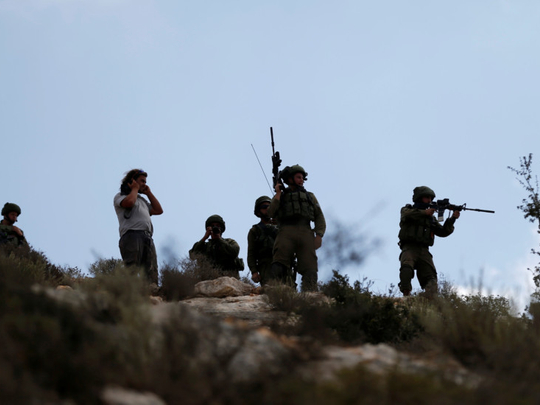
Palestinian children pay a heavy price during every uprising or flare-up that erupts against the Israeli occupation, although they do not pose any real threat to the heavily armed Israeli soldiers. Many knowledgeable Israelis attest to the fact that Palestinian children are, like adults, subjected to torture, unjust trials (denied special courts) and inhumane treatment that violate their basic rights, with complete disregard to their age. Indeed, the Palestinian child in Israel’s view is a ‘terrorist in the making’. Thus they face military courts and harsh and degrading treatment, beatings, sleep deprivation, threats, sexual harassment and denial of visits by relatives.
The Defence for Children International (DCI) affirms that the Israeli occupation and its interrogators have adopted methods that violate the Convention on the Rights of the Child in dealing with detained Palestinian children. According to the organisation, “the occupation authorities resort to solitary confinement during the investigation (sometimes up to 20 days) with the aim of influencing the children psychologically, within a systematic policy aimed at devastating them while extracting confessions by pressure and coercion”. DCI notes that “the military occupation courts also rely on those confessions extracted by interrogators by force to make judgements, regardless of the way they are extracted, including the threat of arresting their parents, long-term imprisonment, the threat of death, beatings or torture”. In another report, DCI said that the occupation army “killed 2000 Palestinian children since the outbreak of the second intifada in September 2000, where no Israeli soldier was held accountable for that”. The report adds: “The Israeli occupation authorities have arrested more than 14,000 Palestinian children since the second intifada, and 350 of them are still in the prisons, including eight minor girls.”
Since 2015, the issue of Palestinian child prisoners has witnessed many other changes, including the adoption of racist laws or draft bills that initiate the issuance of longer sentences against children (in some cases for more than ten years, and even life sentence.) On August 2, 2016, the Israeli Knesset passed a law allowing Israeli courts to try Palestinian children under the age of 14 in the event of “serious acts”. The systematic expansion of the arrests led the Israeli occupation to open new sections for children in Megiddo and Ofer prisons. “There are hundreds of Palestinian children in prisons and interrogation centres, beaten and humiliated, and in isolation in cages,” wrote Assia Ladizhinskaya and Eitan Diamond, two members of the Israeli Parents against Child Detention group. “The figures are horrifying: At every given moment in time, hundreds of Palestinian minors are in prisons, detention and interrogation centres, some of them under administrative detention,” they added. In 2017 alone, the United Nations had documented 185 cases of torture and ill-treatment of minor children in detention centres: Widespread and continuing torture, abuse and isolation.
This was accompanied by inhumane treatment before arriving at the prison where “they are subjected to physical violence, threats, insults, search of naked bodies and deprivation of sleep, food, drink and use of lavatories”. The director-general of the Israel Democracy Institute, lawyer Mordechai Kremnitzer, ridiculed the “most ethical (Israeli) army” premise and asked: “Were the minimum humanitarian measures taken? Even those that were to be taken by an ordinary army that is not even the most moral in the world — an apology and compensation? Does the prosecution consider anyone suspected of belonging to Hamas worthy of death, even when he does not carry a weapon and does not pose a clear danger?” He went on to question the army’s acts: “Isn’t this close to extrajudicial executions, prohibited by international law? Doesn’t it create an unreasonable danger to the lives of civilians who must be protected — a danger that befell the lives of four children?”
Nikolai Mladenov, UN Special Coordinator for the Middle East peace process, recently described the Israeli occupation forces firing at children in the Gaza Strip during the return marches as “disgraceful”. “How can killing a child in Gaza today contribute to peace? This is not possible; it fuels anger and generates more killings. Children must be protected from violence and not exposed to it, nor should they be killed,” Mladenov added.
Seen as potential terrorists, the targeting of Palestinian children is a constant Israeli policy aimed at eliminating nationalistic consciousness of the Palestinians, depriving children of their right to live normally and instilling fear in them that would kill any hope that they may cherish. Israeli authorities realise that the Palestinian child is the nucleus of a generation that will continue to confront the occupation, therefore, the army seeks to hit the strategic stock of the Palestinian people. These children have proved that, like their parents and grandparents, they do not forget their cause (as David Ben Gurion wanted), but shall continue to fight for it.
Professor As’ad Abdul Rahman is the chairman of the Palestinian Encyclopaedia.









